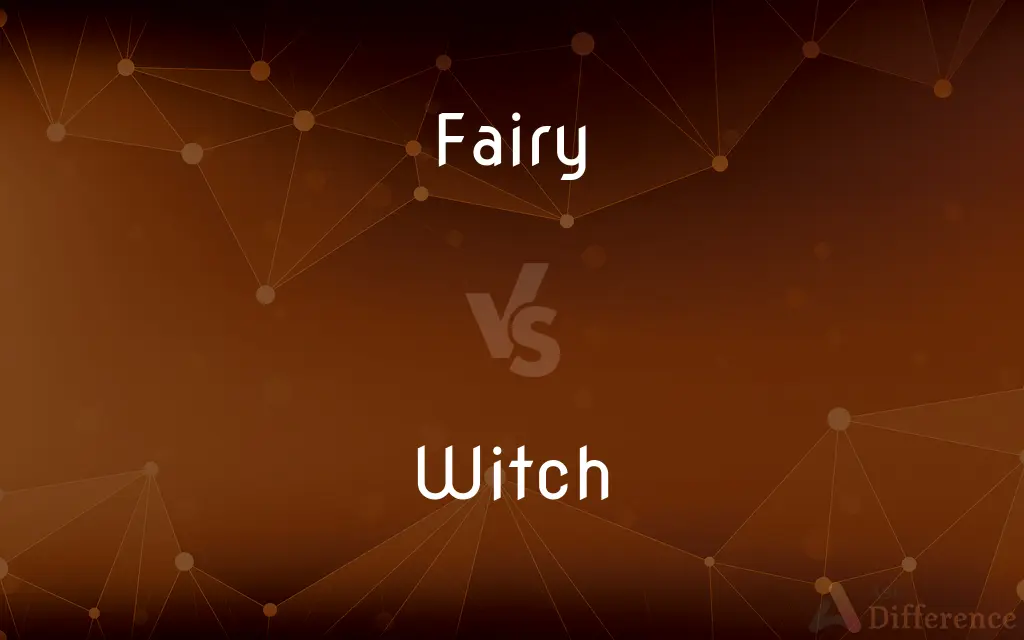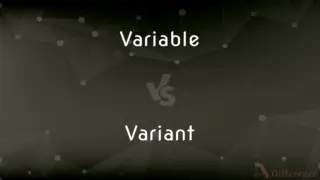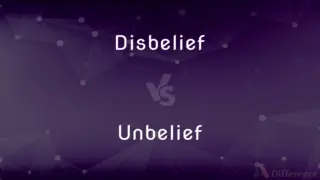Fairy vs. Witch — What's the Difference?
By Tayyaba Rehman & Urooj Arif — Updated on March 13, 2024
Fairies, mythical beings with magical powers and often benevolent nature, contrast with witches, who are humans with learned magical abilities, sometimes perceived as malevolent.

Difference Between Fairy and Witch
Table of Contents
ADVERTISEMENT
Key Differences
Fairies are often depicted as ethereal creatures with a close connection to nature and possess innate magical abilities, often used for benign purposes. Witches, on the other hand, are typically humans who have acquired their magical powers through study and practice, and their intentions can range from benevolent to malevolent.
While fairies are considered to be supernatural beings from folklore, associated with natural elements and possessing a typically small, delicate form, witches are portrayed as practitioners of witchcraft, using spells, potions, and rituals to manipulate magical forces.
The portrayal of fairies is usually positive, highlighting their beauty, grace, and beneficial magic, such as granting wishes or bestowing good fortune. Whereas witches have been depicted in various ways throughout history, from wise healers to figures of fear, often vilified for their supposed dealings with dark powers.
Fairies are believed to live in an enchanted world, often invisible to the human eye, and can choose when to make themselves seen. Witches, however, live in the human world and are part of human society, though they may be secretive about their practices.
In literature and popular culture, fairies often play the role of helpers or guardians, intervening in human affairs in subtle, magical ways. Witches, meanwhile, are frequently portrayed as complex characters who can be either protagonists or antagonists, depending on the narrative.
ADVERTISEMENT
Comparison Chart
Nature
Mythical being with innate magical powers
Human with learned magical abilities
Association
Nature, beauty, benevolence
Magic, spells, varying intentions
Portrayal
Positive, granting wishes, good fortune
Mixed, from healers to figures of fear
Habitat
Enchanted world, often invisible
Human world, secretive about practices
Role in Culture
Helpers, guardians
Complex characters, protagonists or antagonists
Compare with Definitions
Fairy
Mythical beings associated with nature.
Fairies are often seen tending to forests and animals.
Witch
Humans with learned magical skills.
Witches study ancient texts to learn their spells.
Fairy
Typically depicted as benevolent.
Fairies often grant wishes to those who are pure of heart.
Witch
Portrayed as complex characters in stories.
Modern literature often features witches as multifaceted beings with their own stories.
Fairy
Found in folklore and mythology.
European folklore is rich with tales of fairies and their enchantments.
Witch
Use spells, potions, and rituals in their magic.
A witch may brew potions to enchant or to heal.
Fairy
Invisible to humans, unless chosen to be seen.
Children sometimes believe fairies visit them in their gardens.
Witch
Can have benevolent or malevolent intentions.
Some witches use their powers to heal, while others may curse.
Fairy
Possess innate magical abilities.
A fairy can make itself invisible or change its size at will.
Witch
Often misunderstood and vilified in history.
The witch trials in Salem are a dark example of fear of witches.
Fairy
A fairy (also fay, fae, fey, fair folk, or faerie) is a type of mythical being or legendary creature found in the folklore of multiple European cultures (including Celtic, Slavic, German, English, and French folklore), a form of spirit, often described as metaphysical, supernatural, or preternatural. Myths and stories about fairies do not have a single origin, but are rather a collection of folk beliefs from disparate sources.
Witch
A person, especially a woman, claiming or popularly believed to possess magical powers and practice sorcery.
Fairy
A small imaginary being of human form that has magical powers, especially a female one
Fairy gold
She believed she had had fairies at the bottom of her garden
Witch
A believer or follower of Wicca; a Wiccan.
Fairy
A Central and South American hummingbird with a green back and long tail.
Witch
(Offensive) An old woman considered to be ugly or frightening.
Fairy
An imaginary being in human form, depicted as clever, mischievous, and possessing magical powers.
Witch
A woman considered to be spiteful or overbearing.
Fairy
Offensive Slang Used as a disparaging term for a gay man.
Witch
(Informal) A woman or girl considered to be charming or fascinating.
Fairy
The realm of faerie; enchantment, illusion.
Witch
One particularly skilled or competent at one's craft
"A witch of a writer, [she] is capable of developing an intensity that verges on ferocity" (Peter S. Prescott).
Fairy
A mythical being with magical powers, known in many sizes and descriptions, although often depicted in modern illustrations only as a small sprite with gauze-like wings, and revered in some modern forms of paganism.
Witch
To work or cast a spell on; bewitch.
Fairy
An enchantress, or creature of overpowering charm.
Witch
To cause, bring, or effect by witchcraft.
Fairy
A member of two species of hummingbird in the genus Heliothryx.
Witch
To use a divining rod to find underground water or minerals; dowse.
Fairy
A legendary Chinese immortal.
Witch
A person who practices witchcraft.
Fairy
Like a fairy; fanciful, whimsical, delicate.
Witch
(now usually particularly) A woman who is learned in and actively practices witchcraft.
Fairy
Enchantment; illusion.
The God of her has made an end,And fro this worlde's fairyHath taken her into company.
Witch
An ugly or unpleasant woman.
I hate that old witch.
Fairy
The country of the fays; land of illusions.
He [Arthur] is a king y-crowned in Fairy.
Witch
One who exercises more-than-common power of attraction; a charming or bewitching person.
Fairy
An imaginary supernatural being or spirit, supposed to assume a human form (usually diminutive), either male or female, and to meddle for good or evil in the affairs of mankind; a fay. See Elf, and Demon.
The fourth kind of spirit [is] called the Fairy.
And now about the caldron sing,Like elves and fairies in a ring.
Witch
One given to mischief, especially a woman or child.
Fairy
An enchantress.
No goblin or swart fairy of the mineHath hurtful power over true virginity.
Witch
(geometry) A certain curve of the third order, described by Maria Agnesi under the name versiera.
Fairy
Of or pertaining to fairies.
Witch
The storm petrel.
Fairy
Given by fairies; as, fairy money.
Witch
Any of a number of flatfish:
Fairy
Small, human in form, playful, having magical powers
Witch
Glyptocephalus cynoglossus (Torbay sole), found in the North Atlantic.
Witch
Lepidorhombus whiffiagonis (megrim), found in the North Atlantic.
Witch
Arnoglossus scapha, found near New Zealand.
Witch
The Indomalayan butterfly Araotes lapithis, of the family Lycaenidae.
Witch
A cone of paper which is placed in a vessel of lard or other fat and used as a taper.
Witch
(intransitive) To dowse for water.
Witch
To practise witchcraft.
Witch
(transitive) To bewitch.
Witch
A cone of paper which is placed in a vessel of lard or other fat, and used as a taper.
Witch
One who practices the black art, or magic; one regarded as possessing supernatural or magical power by compact with an evil spirit, esp. with the Devil; a sorcerer or sorceress; - now applied chiefly or only to women, but formerly used of men as well.
There was a man in that city whose name was Simon, a witch.
He can not abide the old woman of Brentford; he swears she's a witch.
Witch
An ugly old woman; a hag.
Witch
One who exercises more than common power of attraction; a charming or bewitching person; also, one given to mischief; - said especially of a woman or child.
Witch
A certain curve of the third order, described by Maria Agnesi under the name versiera.
Witch
The stormy petrel.
Witch
A Wiccan; an adherent or practitioner of Wicca, a religion which in different forms may be paganistic and nature-oriented, or ditheistic. The term witch applies to both male and female adherents in this sense.
Witch
To bewitch; to fascinate; to enchant.
[I 'll] witch sweet ladies with my words and looks.
Whether within us or withoutThe spell of this illusion beThat witches us to hear and see.
Witch
A female sorcerer or magician
Witch
A being (usually female) imagined to have special powers derived from the devil
Witch
An ugly evil-looking old woman
Witch
Cast a spell over someone or something; put a hex on someone or something
Common Curiosities
What is a fairy?
A fairy is a mythical being with magical powers, often connected to nature and depicted as benevolent.
Are all fairies good?
While often depicted as benevolent, some folklore includes mischievous or even malevolent fairies.
Do fairies live in our world?
Fairies are said to inhabit an enchanted realm but can interact with the human world.
Where do witches live?
Witches live among humans, often hiding their true nature.
What role do witches play in stories?
Witches can be protagonists or antagonists, with their roles deeply influenced by their moral choices.
Can witches have familiars?
Yes, witches often have familiars, animals with whom they share a magical bond.
How do witches acquire their powers?
Witches learn their craft, studying spells, potions, and magical rituals.
How do fairies and witches differ in their nature?
Fairies are supernatural beings with innate magic, while witches are humans with acquired magical knowledge.
What is a witch?
A witch is a human who practices witchcraft, using learned spells and rituals to manipulate magical forces.
Can witches be benevolent?
Yes, witches can use their powers for good, offering healing and protection.
How are witches perceived in different cultures?
Cultural perceptions of witches vary, from wise healers to feared practitioners of dark magic.
What is the historical significance of witch trials?
Witch trials reflect the fear and misunderstanding of witchcraft, often resulting in persecution of innocent people.
How do fairies acquire their powers?
Fairies are born with their magical abilities, inherent to their nature.
Are fairies always small and winged?
While commonly depicted this way, fairies' appearances can vary greatly in folklore.
What role do fairies play in stories?
Fairies often act as guardians or helpers, using their magic to assist or protect.
Share Your Discovery

Previous Comparison
Variable vs. Variant
Next Comparison
Disbelief vs. UnbeliefAuthor Spotlight
Written by
Tayyaba RehmanTayyaba Rehman is a distinguished writer, currently serving as a primary contributor to askdifference.com. As a researcher in semantics and etymology, Tayyaba's passion for the complexity of languages and their distinctions has found a perfect home on the platform. Tayyaba delves into the intricacies of language, distinguishing between commonly confused words and phrases, thereby providing clarity for readers worldwide.
Co-written by
Urooj ArifUrooj is a skilled content writer at Ask Difference, known for her exceptional ability to simplify complex topics into engaging and informative content. With a passion for research and a flair for clear, concise writing, she consistently delivers articles that resonate with our diverse audience.
















































